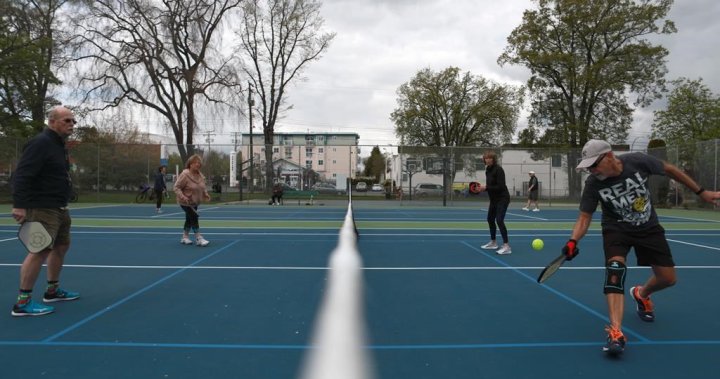The escalating popularity of pickleball, a paddle sport resembling tennis, has sparked a contentious debate in a Halifax suburb, forcing the local municipality to grapple with the delicate balance between fostering recreational activities and addressing residents’ concerns about noise pollution. The distinctive “pop” of the pickleball, amplified by the smaller court size and the hard plastic ball, has become a source of irritation for residents living near Castle Hill Park, where dedicated pickleball courts were installed. The proximity of these courts to a condo complex, a mere 10 meters away, has exacerbated the issue, with the echoing sound invading the tranquility of homes and leading to numerous complaints.
The Halifax Regional Municipality’s community planning and economic development committee has taken a decisive step towards resolving this conflict by voting to revert the pickleball courts back to their original function as tennis courts. This decision, while aimed at appeasing disgruntled residents, comes amidst the sport’s burgeoning popularity across North America. The committee’s recommendation will be presented to the municipal council for a final vote in early 2025. This move underscores the growing pains associated with accommodating new recreational activities in established residential areas, particularly when those activities generate noise levels that impact the quality of life for nearby residents.
The controversy surrounding the Castle Hill Park pickleball courts highlights the challenges municipalities face in managing noise complaints related to recreational activities. Despite efforts to mitigate the noise, such as enforcing designated playing hours and mandating the use of quieter foam balls, the persistent complaints have compelled the municipality to explore alternative locations for pickleball courts. The city staff acknowledged the limitations of these measures, noting the lack of compliance from some players. This situation reveals the complexities of enforcing noise regulations in public spaces, particularly when dealing with a passionate and growing community of players.
The Halifax municipality’s approach to the pickleball noise issue reflects a broader trend across North America, where similar complaints have emerged in various communities. The municipality has drawn inspiration from Vancouver’s model for managing pickleball facilities, which was developed following lawsuits related to excessive noise. Vancouver’s strategy emphasizes the even distribution of pickleball courts throughout the city and the implementation of effective sound barriers to maintain noise levels below 50 decibels. This approach aims to minimize the impact on any single residential area while still providing opportunities for pickleball enthusiasts to enjoy the sport.
The Halifax case study provides valuable insights into the complexities of managing public spaces in the face of evolving recreational trends. The decision to potentially relocate the pickleball courts raises questions about the municipality’s responsibility to provide diverse recreational opportunities while simultaneously safeguarding the peace and quiet of its residents. This delicate balancing act requires careful consideration of various factors, including noise levels, proximity to residential areas, and the demand for specific recreational facilities. The ongoing debate surrounding pickleball courts serves as a microcosm of the broader challenges faced by urban planners and policymakers as they strive to create vibrant and livable communities.
The pickleball noise controversy in Halifax underscores the importance of proactive planning and community engagement when introducing new recreational facilities. Early consultation with residents, coupled with a comprehensive assessment of potential noise impacts, could have helped prevent the current conflict. Moving forward, the municipality’s adoption of a model similar to Vancouver’s, with its emphasis on strategic placement and noise mitigation measures, could provide a more sustainable framework for integrating pickleball and other potentially noisy activities into the urban landscape. This approach would ensure that the benefits of recreational opportunities are enjoyed by all, without unduly infringing on the quality of life of nearby residents. The Halifax experience serves as a valuable lesson for other municipalities grappling with similar challenges.










